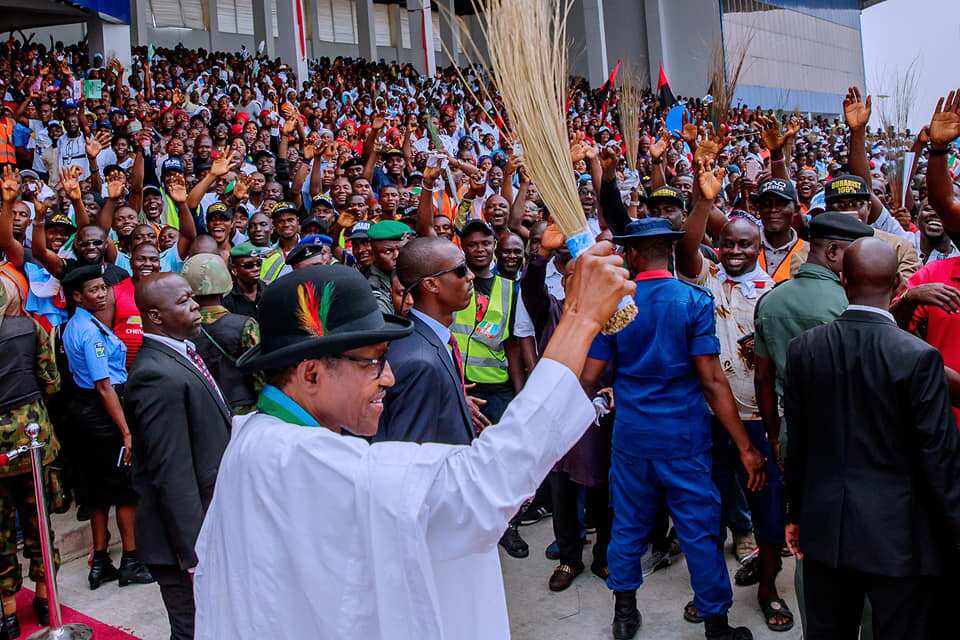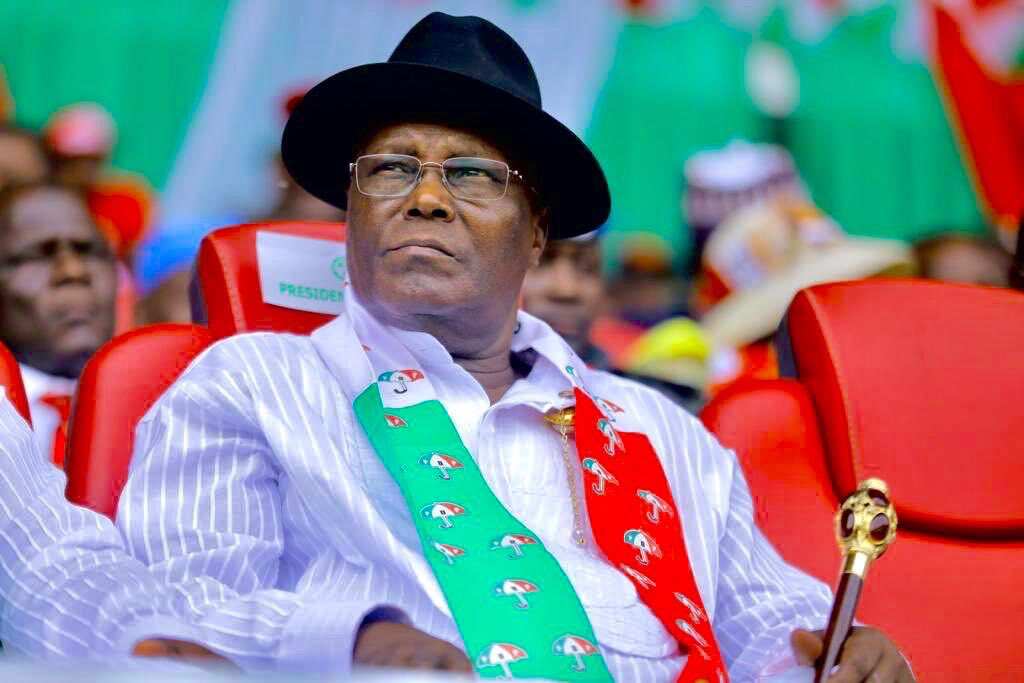Three days to Nigeria’s presidential election, Saturday, February 16, we take a look at what various international/foreign media and analysts have said about President Muhammadu Buhari and Alhaji Atiku Abubakar, the presidential candidates of the APC and the PDP respectively.
Eurasia Group, reputed as the world’s largest political-risk consultancy, said President Buhari will win the February 16 presidential election.
Here is what it said about Buhari’s and Atiku’s chances:
“Opposition candidate Atiku Abubakar has regained some momentum in recent weeks, but President Muhammadu Buhari remains favoured to win (a 60% probability).”
Eurasia Group also published another analysis by Alexandria Kazan and Sungwoo Park titled Politics in Pictures: a visual guide to Top Risks on Monday, January 14.
Here is what the analysts said about President Buhari and Atiku and their prospects:
“A victory for President Muhammadu Buhari will mean little progress on critical policies such as tax or energy sector reform. A win for the challenger, Atiku Abubakar, will create a brief, superficial boost to the country's image before returning to an even more rent-seeking governance….”
“The country faces its most fiercely contested election since the transition to democracy in 1999. One candidate is the incumbent, Muhammadu Buhari. He is an elderly, infirm leader who lacks the energy, creativity, or political savvy to move the needle on Nigeria’smost intractable problems. His opponent is Atiku Abubakar, another gerontocrat who would focus on enriching himself and his cronies, avoiding the difficult and politically unpopular tasks necessary for reform.
“Atiku’s policy priorities are unclear and untested: He had previously promised to deregulate the oil and gas sector but recently pledged to reduce gasoline prices by 50% from already below-market levels. That would swell subsidy costs and endanger long-term debt sustainability. He’s also unlikely to champion a tax reform that’s critical to Nigeria’s fiscal sustainability.
“Atiku would face significant infighting within his People’s Democratic Party as well, as leaders try to hold him to his promise to serve only one term (a pledge he’s likely to retract).”
Also, Financial Times, an international daily newspaper owned by Nikkei Inc, headquartered in London, with a special emphasis on business and economic news, also has something to say about both President Buhari and Atiku.
Neil Munshi, Financial Times’ West Africa correspondent, in an analytical article titled Nigeria president battles perceptions of frailty in poll race examined the top presidential candidates.

President Buhari storms Bayelsa with APC campaign rally on Tuesday, February 12. Credit: Femi Adesina
Munshi wrote: “Mr Buhari is trusting to a fault, his allies say, and reluctant to eject anyone from his inner circle. Critics accuse him of being soft on those who have served him poorly or been accused of corruption. On stage at the Kano rally Mr Buhari locked hands with a state governor who was the alleged subject of a series of viral videos in which a man reported to be him is seen accepting stacks of hundred dollar notes.
But the president may have found his perfect foil in Mr Abubakar, who has long been dogged by accusations of crony capitalism and corruption, which he denies. Despite allegations of graft among some of Mr Buhari’s closest associates, the president retains a reputation for incorruptibility. He won in 2015 largely because his predecessor’s government was accused of looting billions of dollars from the country’s coffers.”
The Economist Intelligence Unit, a British business within the Economist Group providing forecasting and advisory services through research and analysis, political and economic forecasts, etc, predicted a win for Atiku

The PDP presidential candidate during his Lagos campaign rally. Credit: Atiku Abubakar
The EIU Africa said though the margin of victory is getting narrower as the election approaches, Atiku and his political party will win the historic election.
The EIU Africa tweeted:“#NigeriaDecides2019 : Less than 2 weeks before #Nigeria‘s presidential election. Abubakar has floated idea of corruption amnesty. It is arguably an impolitic time for such a delicate proposal.
“Abubakar is hard-pressed to convince voters that he is a clean politician, having been on the receiving end of numerous graft allegations in the past.
“We retain our forecast for #Abubakar to win, but expected margin of victory is narrowing as the poll approaches.
Paul Wallace, Africa correspondent for Bloomberg also has something to say about Buhari and Atiku in his article titled Nigeria’s Brutal Decision: Former Dictator or Alleged Kleptocrat
Wallace described President Buhari as “a former dictator who’s presided over four years of lackluster growth” and Atiku as “an alleged kleptocrat of international repute”.
His words: “Buhari, who led Nigeria briefly in the 1980s as a dictator, came back to power four years ago via the ballot box. After military rule ended in 1999, he contested several elections unsuccessfully before finally becoming the first opposition figure to win the presidency. (He describes himself as a “converted democrat.”) Voters and pundits alike were optimistic that he could diversify the oil-dependent economy, tackle graft, and end Boko Haram’s deadly insurgency. While the stern former general has succeeded in stamping out some of the corruption that’s long blighted Nigeria, critics say he’s been selective, mostly targeting his political opponents. They also say he’s failed on other issues, nicknaming him “Baba Go-Slow” in reference to his age and sluggish response to crises.
“Abubakar, widely known as Atiku, is a father of 26 who has business interests ranging from oil and gas services to food manufacturing. He’s pledged to loosen the state’s grip on the economy, end the naira’s peg to the dollar, and privatize companies including the Nigerian National Petroleum Corp., which dominates the local energy industry. But for all his market-friendly talk—he admires the late Conservative UK Prime Minister Margaret Thatcher—many Nigerians think he used his past positions in government to enrich himself.”
“A US Senate report in 2010 concluded that Abubakar and one of his wives had wired $40 million of “suspect funds” into American accounts and said that his business dealings “raise a host of questions about the nature and source” of his wealth. Although he has denied the claims and has never been indicted at home or abroad, Abubakar hasn’t been able to shake the perception of impropriety.”
The Guardian, an independent British daily newspaper, also talks about President Buhari and Atiku in its editorial titled The Guardian view on Nigeria’s elections: 84m voters deserve better.
On Buhari:
“Nigeria celebrated Mr Buhari’s election in 2015 as not only a resounding rejection of the unpopular Goodluck Jonathan but also the first democratic transition since the return of civilian rule in 1999.
Unfortunately, the highlight of Mr Buhari’s presidency appears to have been the gaining of it. The economy struggles, and his pledges to curb rampant corruption have been applied to political opponents. Insecurity remains a pressing issue: notably, Boko Haram appears to be resurging despite the government’s repeated assurances that it has beaten the extremist group, and a spreading herder-farmer conflict has killed thousands. The president’s extended absence overseas, for medical treatment, prompted such persistent rumours of his death and replacement by a body double that he felt obliged to tell voters: “It’s the real me, I assure you.”
On Atiku
“…But Mr Abubakar has won the backing of an influential bloc including former military heads of state. Supporters portray him as an energetic contrast to the ineffective incumbent; opponents highlight corruption allegations, including a 2010 US Senate report which said that he and one of his wives had wired $40m of “suspect funds” into American accounts. Mr Abubakar denies the claims.
No comments:
Post a Comment